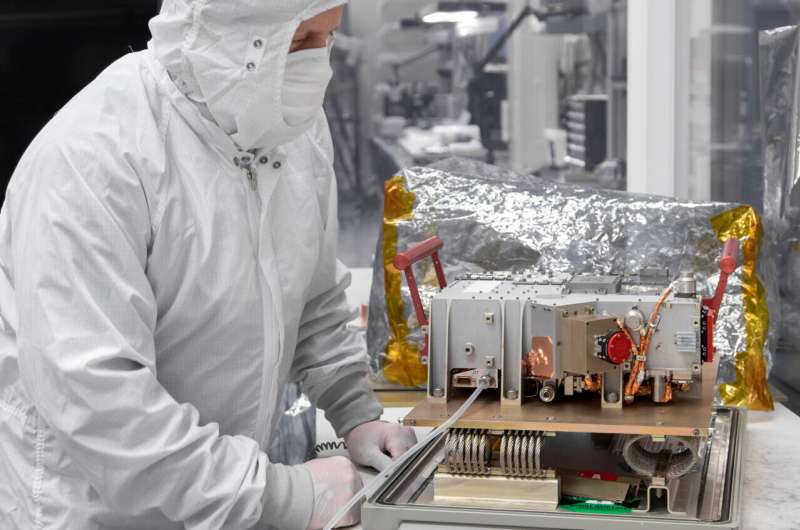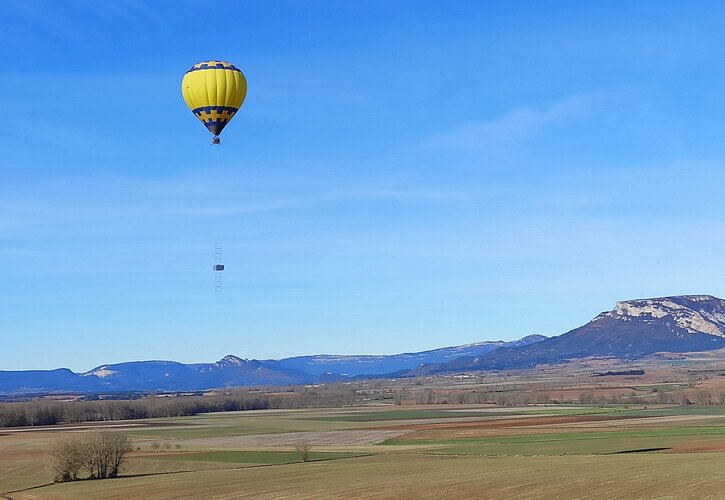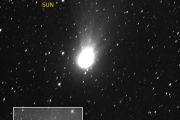
Copernical Team
Satellite operator OneWeb suspends Baikonur launches
 Global satellite communications company OneWeb announced on Thursday that its board had voted to suspend all launches from Russia's Baikonur Cosmodrome in Kazakhstan.
Russia's space agency Roscosmos has sought guarantees from OneWeb and Europe's Arianespace that satellites it plans to launch this year will not be used for military purposes.
It also demanded the UK government give up its
Global satellite communications company OneWeb announced on Thursday that its board had voted to suspend all launches from Russia's Baikonur Cosmodrome in Kazakhstan.
Russia's space agency Roscosmos has sought guarantees from OneWeb and Europe's Arianespace that satellites it plans to launch this year will not be used for military purposes.
It also demanded the UK government give up its Robotic OSAM-1 mission completes its Critical Design Review
 NASA's On-orbit Servicing, Assembly, and Manufacturing 1 (OSAM-1), a mission that will be the first to robotically refuel a satellite not designed to be serviced, and will also demonstrate assembly and manufacturing technologies and capabilities, has passed its mission critical design review (CDR). This is an important milestone that paves the way for the construction of the spacecraft, payloads
NASA's On-orbit Servicing, Assembly, and Manufacturing 1 (OSAM-1), a mission that will be the first to robotically refuel a satellite not designed to be serviced, and will also demonstrate assembly and manufacturing technologies and capabilities, has passed its mission critical design review (CDR). This is an important milestone that paves the way for the construction of the spacecraft, payloads Sanctions on Russia add to troubles facing global helium industry
 Helium is the second most-abundant element in the known universe, but to the semiconductor fabricators and doctors who rely on it for their businesses, it is better known as the latest raw material to grow scarce - and the war in Ukraine could make the shortage worse.
Russia is expected to eventually begin producing the equivalent of a third of the world's current helium production from a m
Helium is the second most-abundant element in the known universe, but to the semiconductor fabricators and doctors who rely on it for their businesses, it is better known as the latest raw material to grow scarce - and the war in Ukraine could make the shortage worse.
Russia is expected to eventually begin producing the equivalent of a third of the world's current helium production from a m Roscosmos Chief warns cyberattacks against Russian satellites sre 'Casus Belli'
 It was earlier claimed that a hacker group called "NB65" had "shut down" the control centre of Russia's space agency Roscosmos.
Attempts by hackers to attack Russian satellites are "casus belli", said Roscosmos head Dmitry Rogozin.
"I want to warn those who are trying to do this that this is a crime that should be very severely punished, because the removal of the space grouping of a
It was earlier claimed that a hacker group called "NB65" had "shut down" the control centre of Russia's space agency Roscosmos.
Attempts by hackers to attack Russian satellites are "casus belli", said Roscosmos head Dmitry Rogozin.
"I want to warn those who are trying to do this that this is a crime that should be very severely punished, because the removal of the space grouping of a Integrated deterrence is key to protecting US, Allies and Partners
 Strategic competitors China and Russia have watched the Defense Department's way of projecting power for at least two decades, if not longer, the commander of U.S. Northern Command said.
"They understand if we're allowed to project that force forward, that won't turn out well. So, they've developed capabilities below the nuclear threshold to hold us at risk with the idea that they can dela
Strategic competitors China and Russia have watched the Defense Department's way of projecting power for at least two decades, if not longer, the commander of U.S. Northern Command said.
"They understand if we're allowed to project that force forward, that won't turn out well. So, they've developed capabilities below the nuclear threshold to hold us at risk with the idea that they can dela The state of planetary defense in the 2020s
 The Earth exists in a dangerous environment. Cosmic bodies, like asteroids and comets, are constantly zooming through space and often crash into our planet. Most of these are too small to pose a threat, but some can be cause for concern.
As a scholar who studies space and international security, it is my job to ask what the likelihood of an object crashing into the planet really is - and w
The Earth exists in a dangerous environment. Cosmic bodies, like asteroids and comets, are constantly zooming through space and often crash into our planet. Most of these are too small to pose a threat, but some can be cause for concern.
As a scholar who studies space and international security, it is my job to ask what the likelihood of an object crashing into the planet really is - and w How commercial satellites are shaping the Ukraine conflict
 From a huge Russian military convoy snaking its way to Kyiv to missile strikes and refugee crossings, commercial satellite imagery of the Ukraine conflict is helping lift the fog of war, illuminating for the public what was previously the domain of spy agencies.
Technologies that can pierce cloud cover and work at night are also coming to the fore, as a growing army of open-source intelligen
From a huge Russian military convoy snaking its way to Kyiv to missile strikes and refugee crossings, commercial satellite imagery of the Ukraine conflict is helping lift the fog of war, illuminating for the public what was previously the domain of spy agencies.
Technologies that can pierce cloud cover and work at night are also coming to the fore, as a growing army of open-source intelligen Ultraviolet instrument to play integral part of NASA's Europa Clipper mission

An ultraviolet spectrograph (UVS) designed and built by Southwest Research Institute (SwRI) is the first scientific instrument to be delivered for integration onto NASA's Europa Clipper spacecraft. Scheduled to launch in 2024 and arrive in the Jovian system by 2030, Europa Clipper will conduct detailed reconnaissance of Jupiter's moon Europa and investigate whether it could harbor conditions suitable for life.
NASA begins assembly of Europa Clipper spacecraft

Science instruments and other hardware for the spacecraft will come together in the mission's final phase before a launch to Jupiter's icy moon Europa in 2024.
When it's fully assembled, NASA's Europa Clipper will be as large as an SUV with solar arrays long enough to span a basketball court—all the better to help power the spacecraft during its journey to Jupiter's icy moon Europa. And just about every detail of the spacecraft will have been hand-crafted.
The assembly effort is already underway in clean rooms at the agency's Jet Propulsion Laboratory in Southern California. Now, engineering components and science instruments are beginning to stream in from across the country and Europe.
Aerial antenna for Venus mission test
 Image:
Aerial antenna for Venus mission test
Image:
Aerial antenna for Venus mission test 































